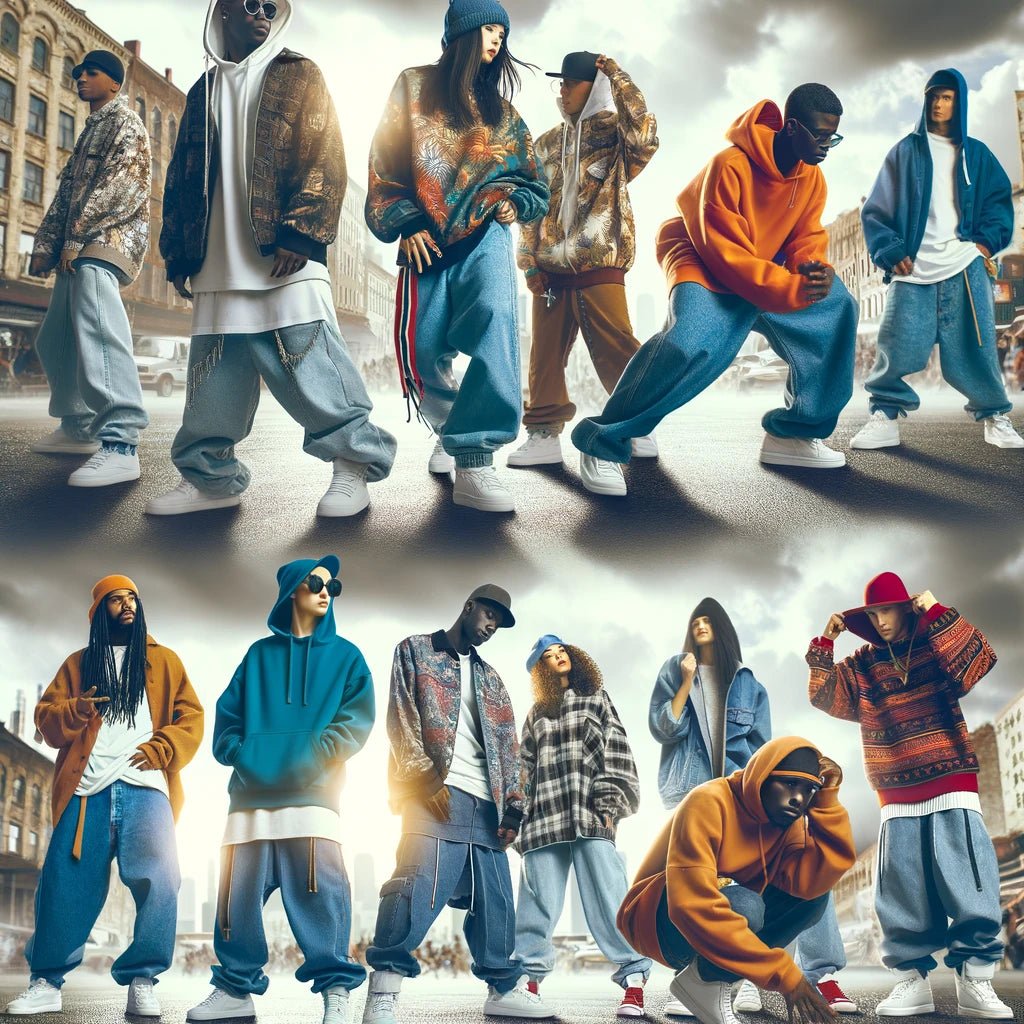Why Do Hip Hop People Wear Baggy Clothes?

The trend of wearing baggy clothes in hip-hop culture has several origins and reasons:
1. Cultural Roots in the 1980s and 1990s: The style emerged in the late 1980s and early 1990s. Hip-hop fashion at this time was heavily influenced by the music and the cultural scene, particularly in urban areas. The loose clothing style was part of a larger cultural expression that included graffiti, breakdancing, DJing, and rapping.
2. Influence from Prison Culture: Some of the influences for baggy clothes came from prison culture. In prisons, belts are often not allowed, leading to a sagging style of the pants. This style was then adopted by some in the hip-hop community as a sign of rebellion or to maintain a connection with life on the streets.
3. Comfort and Practicality: Baggy clothes are often more comfortable, especially for activities like dancing, which is a significant part of hip-hop culture. The loose fit allows for greater movement and flexibility.
4. Symbol of Resistance and Identity: Baggy clothing became a symbol of resistance against the mainstream and a form of identity for those within the hip-hop community. It was a way of standing apart from the traditional, often more constrictive styles of mainstream fashion.
5. Influence of Hip-Hop Artists: Influential hip-hop artists and groups who wore baggy clothes had a significant impact on popularizing the style. Fans often emulate the fashion of their favorite artists.
6. Fashion Trends and Brand Endorsements: As hip-hop music gained popularity, fashion brands began to target the hip-hop market. Some brands specifically produced baggy clothing lines, and endorsements by hip-hop artists made the style even more popular.
7. Evolution and Variation: Over the years, the style has evolved, and there's now a wide range of fashion within hip-hop, with some artists and fans choosing more fitted clothing. However, the baggy style remains a notable part of hip-hop's fashion history.
It's important to note that while baggy clothes are associated with hip-hop culture, not everyone in the hip-hop community embraces this style, and the fashion choices within the community are diverse and continually evolving.
1. Cultural Roots in the 1980s and 1990s: The style emerged in the late 1980s and early 1990s. Hip-hop fashion at this time was heavily influenced by the music and the cultural scene, particularly in urban areas. The loose clothing style was part of a larger cultural expression that included graffiti, breakdancing, DJing, and rapping.
2. Influence from Prison Culture: Some of the influences for baggy clothes came from prison culture. In prisons, belts are often not allowed, leading to a sagging style of the pants. This style was then adopted by some in the hip-hop community as a sign of rebellion or to maintain a connection with life on the streets.
3. Comfort and Practicality: Baggy clothes are often more comfortable, especially for activities like dancing, which is a significant part of hip-hop culture. The loose fit allows for greater movement and flexibility.
4. Symbol of Resistance and Identity: Baggy clothing became a symbol of resistance against the mainstream and a form of identity for those within the hip-hop community. It was a way of standing apart from the traditional, often more constrictive styles of mainstream fashion.
5. Influence of Hip-Hop Artists: Influential hip-hop artists and groups who wore baggy clothes had a significant impact on popularizing the style. Fans often emulate the fashion of their favorite artists.
6. Fashion Trends and Brand Endorsements: As hip-hop music gained popularity, fashion brands began to target the hip-hop market. Some brands specifically produced baggy clothing lines, and endorsements by hip-hop artists made the style even more popular.
7. Evolution and Variation: Over the years, the style has evolved, and there's now a wide range of fashion within hip-hop, with some artists and fans choosing more fitted clothing. However, the baggy style remains a notable part of hip-hop's fashion history.
It's important to note that while baggy clothes are associated with hip-hop culture, not everyone in the hip-hop community embraces this style, and the fashion choices within the community are diverse and continually evolving.
More Articles
Subscribe to our RSS Feed for the Latest Posts!








